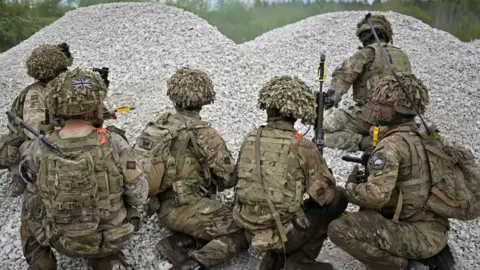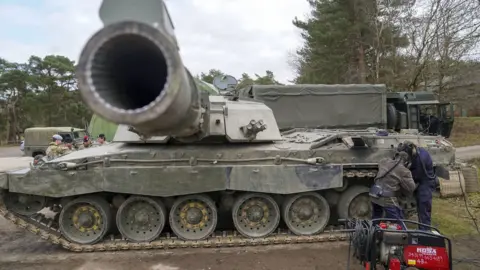Cuts leave military at risk amid rising threats, say MPs
 Getty Images
Getty ImagesPlanned cuts to the British military leave it vulnerable at a time of rising threat, a report from MPs says.
The Commons defence select committee report says flaws in a major defence review have been exposed by the Ukraine war and the return of the Taliban.
It adds the Ministry of Defence appears arrogant and unwilling to learn lessons by refusing to revise its plans.
The MoD said it would adapt its "strategy and response to meet emerging threats and challenges".
The Integrated Defence and Security review, published in March 2021, was completed before Russia's invasion of Ukraine and Nato's withdrawal from Afghanistan.
But the new Defence select committee report says both those events are "seemingly dismissed as insignificant and there appears to be no intention to revisit the conclusions" of the review.
The integrated review included cuts to the number of troops, armoured vehicles and tanks to help fund investment in new technologies and to fight in the new domains of space and cyber.
But MPs say it has left "capability gaps" in Britain's armed forces.
The committee says some military equipment is being retired before a replacement is introduced and it also criticises a reliance on untested and unproven technologies.
The MPs describe the MoD's track record in large equipment programmes as "abysmal".
They question reduction in heavy armour at a time when tanks and artillery are so prevalent in the war in Ukraine. The committee says that conflict has shown that tanks and artillery are still very much a part of modern warfare.
The war has also meant that, as the UK has supplied Ukraine with weapons and ammunition, its stockpiles are being depleted without the industrial capacity available to replace them.
Deja vu
The report says that capability gaps which were seen as acceptable at the time of the review are now no longer palatable. It says the review has left Britain's armed forces vulnerable.
And it said the decision to cut the number of troops in the Army from 82,000 to 73,000 was "perverse".
It noted that the armed forces were also being used as "backfill" to carry out civilian tasks by Whitehall departments which were "seemingly unable to respond to crises".
 PA Media
PA MediaThe defence committee describes a sense of deja vu with Britain's military ambitions once again not matched by resources. There is also a sense of deja vu with the MPs' report - which is one of many making the case for an increase in defence spending.
While committee members welcome a recent rise in the MoD budget, worth £16bn over four years, they warn that much of that extra cash will be eaten away by rising inflation.
The report recommends a further, long-term increase, but adds the MoD must ensure that money is not wasted.
Committee chairman Tobias Ellwood MP said: "With open war raging in Europe, widespread economic instability and the catastrophic Afghanistan withdrawal underscoring the government's lack of preparedness for international crises, we must be clear-eyed about the challenges ahead".
He added: "We need to spend more and spend it wisely. We must act now to prepare and consolidate our nation's defences. Anything less would be a denial of the reality we face".
Responding to the report, an MoD spokesperson defended the review.
It said it "put a threat-led approach firmly at the heart of the MoD's work".
It added: "We are delivering our vision to support and equip our armed forces, including the need to invest for the long term in vital capabilities such as future fighter jets, nuclear submarines and more advanced tanks."

- BBC REWIND: A unique archive of life in the UK since the 1940s
- MATHS CHALLENGE: Can you predict the patterns?

